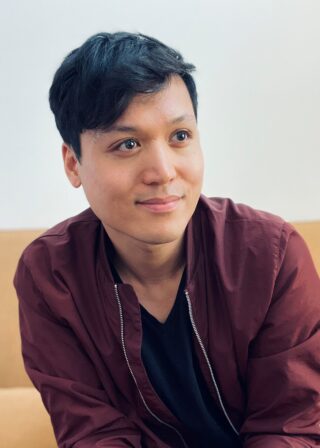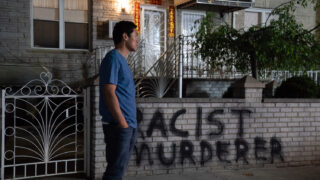The underdog congressional campaign of David Kim
It has been said that the political identity of Korean Americans was forged in the fires of Sa-I-Gu (also known as the Los Angeles Riots). Following the Rodney King verdict and the sentencing of Soon Ja Du, an uprising of Black community members and their allies took place in Los Angeles’ Koreatown on April 29, 1992. Korean-owned convenience stores burned to the ground. Korean storeowners picked up arms and weapons to defend their livelihoods. Without political representation, immigrant Korean families were forced to reckon with what it meant to be Korean in America and what they wanted for their future generations.
“The definition of the American Dream was no longer only about financial success and sending your kids to school, but it was instead about political representation, civic engagement, bettering our relations with other ethnic communities,” director Joseph Juhn says about the aftermath of Sa-I-Gu.
Flash forward nearly three decades later and still only one Korean American has been ever elected to Congress. In “Chosen,” Juhn follows all five Korean American congressional candidates as they campaign for office in 2020. The documentary is especially concerned with the underdog David Kim, running for a seat to represent CA-34, the congressional district where Koreatown is located.
Even today, CA-34 is the district with the largest population of Koreans in the U.S. The district is also the 15th poorest among the 435 U.S. districts. Kim wants to change that. An immigration lawyer, he has big dreams, limited resources, and no foothold in his community. Some in the film call him a Korean Alexandria Ocasio-Cortez, with a platform supporting universal basic income and Medicare for All, among other progressive issues.
When asked about Kim’s campaign, the audience is told point blank that Kim is “running a hopeless campaign” against a fellow Democrat and incumbent. “If you walk into his office, literally all the volunteers are saying, ‘We’re gonna win by a landslide.’ The moment I step out of his office, everyone is saying ‘He has no chance,’” Juhn recalls.
Many Korean Americans are caught saying, “We don’t know of him in the community,” essentially asking, “Who is David Kim?” The course of the film strives to answer that question by diving deeper into Kim’s childhood, his political agenda, and how he compares to the other Korean Americans running. Those other candidates are Michelle Steel, the Supervisor of Orange County and a Republican; Young Kim, a staff member of the California congressman Ed Royce and also a Republican; Marilyn Strickland, a Black and Korean Democrat who was formerly the mayor of Tacoma; and finally, the only incumbent candidate, Andy Kim, a New Jersey congressman.
A Korean American himself, Juhn wanted to show how his community has evolved from having no representation to five candidates in the 2020 election. But do not mistake “Chosen” as a bipartisan in its storytelling. Juhn notes that the comparison of Kim to his conversative counterparts actually “highlights Kim’s particular sort of ideological leaning and his passion for the social causes he is involved in.”
It is disorienting to see Young Kim and Michelle Steel shaking hands with President Donald Trump, holding space with his MAGA-capped crew made up of mostly young white men, and hear them talk their stance against undocumented immigrants at a time where families were being separated at the border. Juhn catches a peculiar moment where Steel makes a speech to a room full of white people. She says in a serious tone, “I am one of you. I am a first-generation immigrant.” It is even more disorienting to see their campaigns interspliced with footage of David Kim participating in Black Lives Matter rallies, canvassing the streets with immigration activists, and grassroots campaigning on the streets.
In spite of all their differences, there are similarities that go to show that Korean Americans are more alike than unlike. Kim went to law school to “give people who come to this country the opportunity to pursue the American Dream, just like [his] parents did.” Despite being on the other side of the aisle, Steel’s political ambitions were born out of a desire to help small business owners like her mother. In that way, the Korean American experience Juhn puts forth is shaped by immigration and family histories.
But family histories can be quite dark as well. Kim very vulnerably shares that he is a gay man who experienced childhood physical abuse at the hands of his father, a pastor. Both his parents refuse to accept his sexual orientation and turn to prayers and threats. While it is jarring to see these typically private moments played out on screen, these moments are ones that deeply resonate with those who struggle with family members intergenerationally. Juhn notes, “[Kim] really wanted those elements in there, because that’s the only way for him to really tell why he has such difficulties reaching out to the Korean community, and how his personal trauma translates to his general fear of approaching fellow Korean American members.”
Deep down, Kim worries that he won’t be accepted by his fellow Korean Americans in the CA-34 district. When meeting with stakeholders, they are pleasantly surprised to learn he speaks fluent Korean — he also speaks Spanish and is heard chanting in solidarity with immigration activists. Sadly, his greatest fears pan out and the local Korean newspaper backs his rival in the race rather than him.
Throughout “Chosen,” Juhn prods at this notion of acceptance. What does it mean to be Korean enough to be seen by the community? At his election day party, Kim’s father vocally judges his sexuality and his choices, essentially crashing a celebration that was meant to uplift Kim for months of hard work that went into even getting on the ballot. At the end of the night, we are left with an image of Kim still caring for his father, holding him up as he walks them to a car. What is more Korean than this display of unrequited respect and love for one’s family?
By the end of the film, he’s amassed over 200 volunteers, and he is no longer alone while canvassing the Los Angeles streets. Kim’s built a community of his own, but unfortunately it was not enough for him to win the race. Today, Kim is campaigning again for election and shared that after much strife, his father has finally accepted him for who he is.
“This literally happened five or six days ago. And there was a month of heavy concern for both myself and Kim, because [Kim’s] father found out about the contents of the film through a mutual friend who watched the film,” Juhn says. “I would say it was divine intervention, almost, [to get him to] where he realized that his way of loving his children was unfit and needed some serious deliberation. Last week, Kim’s father texted him and told them that he loves him and accepts him as who he is.”
“Chosen” is the humble product of over 200 hours of film and cross-country travel. Juhn sacrifices storytelling to share perspectives that are not siloed within the Korean American community, displaying how the candidates decide to position themselves among other groups. Ultimately, the film campaigns for David Kim, showing again and again how he puts his community first, but alongside that focus, the film also dismantles the stereotype that you can think of Koreans in America (or even more generally, Asian Americans) as a monolith.
“Chosen” screened at the 45th Asian American International Film Festival.



